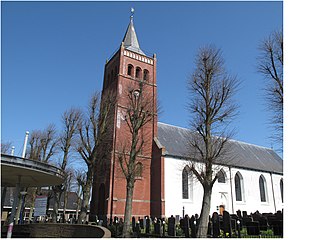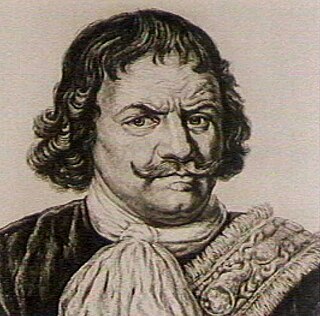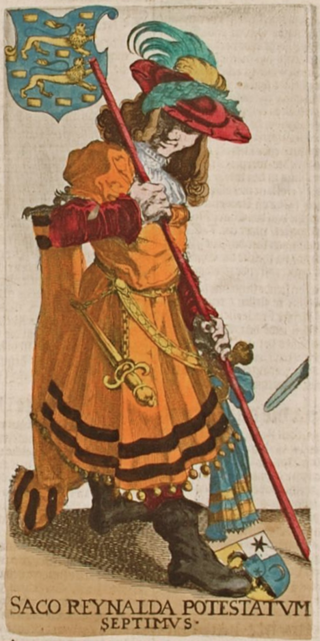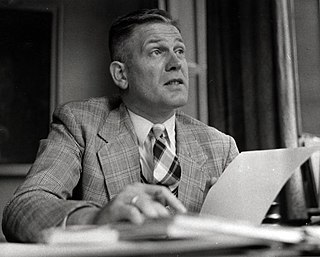Related Research Articles

Sexbierum is a village in the municipality of Waadhoeke, in the central north of the Netherlands.

Podestà was the name given to the holder of the highest civil office in the government of the cities of Central and Northern Italy during the Late Middle Ages. Sometimes, it meant the chief magistrate of a city state, the counterpart to similar positions in other cities that went by other names, e.g. rettori ("rectors").

Juw Dekema was a Frisian chieftain and Schieringer in Weidum and Baard, who was elected as potestate of Friesland in 1494 at the diet of Sneek. In 1498 he asked Albrecht of Saxony to rule the land. Juw served as a councilor at the Court of Friesland (1500–1515) and magistrate of Baarderadeel (1510–1512).
Barradeel is a former municipality in the Dutch province of Friesland. It was located north of Harlingen and Franeker, and is now largely a part of Franekeradeel. The municipality existed until 1984.

Tjerk Hiddes de Vries was a naval hero and Dutch admiral from the seventeenth century. The French, who could not pronounce his name, called him Kiërkides. His name was also given as Tsjerk, Tierck or Tjerck.
Sikke Sjaardema, alternatively spelled Sikko or Sicka, was the eighth potestaat of Friesland, a province of the Netherlands. The potestaat was the elected provincial ruler.

Gale Hania was the thirteenth potestaat of Friesland, a province of Netherlands.
Sytse Dekama was the twelfth potestaat of Friesland, which was in the time of the religious disputes between Schieringers and Vetkopers. There is little known about Sytse Dekama only historian Occo Scarlensis mentions Dekama. He succeeded Juw Juwinga when he died in 1396.
Taco Ludigman was the legendary second potestaat of Friesland. There are no contemporary sources for his true historicity, nor are there any coins or other archaeological evidence.
Hessel Martena was the tenth Potestaat of Frisia. He succeeded Reinier Camminga.
Reinier Camminga was the ninth potestaat or governor of Friesland now a province of the Netherlands.
Igo Galama was the legendary fifth potestaat of Friesland, now a province of the Netherlands. There is no evidence that he existed.
Sjoerd Pijbes Wiarda was the fifteenth potestaat of Friesland now a province of the Netherlands.
Gosse Ludigman was a legendary potestaat of Friesland, now a province of the Netherlands. He does not appear in sources until hundreds of years after his supposed life.

Saco Reinalda was a legendary potestaat of Friesland, now a province of the Netherlands. Sometimes his name was written as Rengnalda, his son was called Wilco Reinalda.
Hessel Hermana is the fourth potestaat of Friesland in the list of rulers of Frisia. Supposedly from Sexbierum, he does not appear in historical sources until the late 16th century.

Sixtinus Amama was a Dutch Reformed theologian and orientalist. Amama was among the first to advocate a thorough knowledge of the original languages of the Bible as indispensable to theologians.

De Korenaar is a smock mill in Sexbierum, Friesland, Netherlands which was built in 1868 and is in working order. The mill is listed as a Rijksmonument.

Sybren van Tuinen (1913–1993) was a Dutch politician and public servant. Trained as a history teacher during World War II, he was acting mayor of Bolsward and mayor of Dokkum, and then for twenty years a representative in the Provincial States of Friesland. He served for two years in the Dutch Senate for the Anti-Revolutionary Party, and then became mayor of Kampen.
Potestaat was the title of a governor of medieval Friesland. According to the legendary 8th-century Karelsprivilege, which is probably a later forgery, Charlemagne had first granted the title of potestaat to Magnus Forteman. He and most of his early successors were probably entirely fictional, invented later by pseudohistorians in order to argue in favour of the notion of Frisian freedom. The title potestaat does not appear in historical documents until 1470, and at most, the earliest potestaatavant la lettre can be dated to the 13th century.
References
- Wopke Eekhoff Beknopte geschiedenis van Friesland, in hoofdtrekken 1851 p 490 [ google books]
- Volksalmanak p 26 [ permanent dead link ]